Omega-3s and Parkinson’s: Supporting Mood and Cognitive Clarity
Introduction
When people think of Parkinson’s disease (PD), they often picture tremors, stiffness, and slowed movement. But beneath those physical changes lies a complex web of biochemical shifts that deeply affect mood, focus, and emotional regulation.
Among the many nutrients that can help the brain stay resilient, omega-3 fatty acids stand out for their powerful role in supporting cognitive clarity, mood balance, and overall neural health. These essential fats, found in fish oil and certain plant sources, don’t just protect the brain — they help it function more smoothly amid the challenges of neurodegeneration.
This article dives into how omega-3s influence brain chemistry, why they matter in Parkinson’s, and how they can be integrated safely into a holistic care plan that supports both mind and mood. 🌿
Looking for supplements for This? Click here.
🌊 What Are Omega-3 Fatty Acids?
Omega-3 fatty acids are polyunsaturated fats crucial for brain structure and function. The three main types are:
ALA (alpha-linolenic acid) — found in flaxseeds, chia seeds, and walnuts.
EPA (eicosapentaenoic acid) — found in cold-water fish like salmon and sardines.
DHA (docosahexaenoic acid) — found in similar fish sources and known as the most essential fat for brain membranes.
Your body can’t produce omega-3s efficiently on its own, making dietary intake or supplementation essential. DHA forms up to 40% of the brain’s polyunsaturated fatty acids, meaning that every neuron depends on it to transmit signals properly.
In Parkinson’s, where dopamine-producing neurons deteriorate, the cell membranes around these neurons become more vulnerable to oxidative stress. Omega-3s help strengthen those membranes, reduce inflammation, and support the regeneration of neural pathways.
🔬 How Parkinson’s Affects the Brain and Mood
Parkinson’s disease disrupts the brain’s communication network in several ways:
Dopamine loss: The degeneration of dopaminergic neurons in the substantia nigra reduces the brain’s reward and motivation systems.
Inflammation: Chronic microglial activation (the brain’s immune response) produces inflammatory cytokines that damage neurons.
Oxidative stress: The brain becomes overloaded with reactive oxygen species, which further harm dopamine-producing cells.
Neurotransmitter imbalance: Serotonin, norepinephrine, and GABA — crucial for mood regulation — become dysregulated.
These biological changes can manifest as emotional symptoms such as anxiety, depression, apathy, and irritability. They may even appear years before motor symptoms.
Omega-3 fatty acids are uniquely positioned to counteract several of these processes at once — improving both mood regulation and cognitive clarity.
🌞 Omega-3s and Mood in Parkinson’s
Depression and anxiety are among the most common non-motor symptoms in Parkinson’s, affecting nearly half of all patients. These mood shifts are not just psychological; they are chemical.
🧩 Boosting Serotonin and Dopamine Function
Omega-3s help cell membranes remain fluid, allowing neurotransmitter receptors to work efficiently. DHA, in particular, makes serotonin receptors more sensitive — meaning serotonin signals travel more smoothly.
EPA helps regulate dopamine release and reuptake, improving motivation, pleasure, and emotional balance. This is especially important since dopamine loss underlies much of Parkinson’s emotional instability.
🌸 Reducing Inflammation Linked to Depression
Inflammation in the brain contributes to depressive symptoms by suppressing neurotransmitter production. Omega-3s, especially EPA, reduce pro-inflammatory cytokines like IL-6 and TNF-alpha.
Clinical studies show that EPA-rich omega-3 supplements can reduce depressive symptoms as effectively as some antidepressants — but with fewer side effects.
🌿 Balancing the Stress Response
Chronic stress worsens Parkinson’s symptoms by raising cortisol, which further disrupts dopamine. Omega-3s normalize the hypothalamic-pituitary-adrenal (HPA) axis, lowering cortisol and restoring emotional steadiness.
💬 A Real-World Note
Many people with Parkinson’s describe feeling “flat” or “disconnected” emotionally — a state sometimes called emotional blunting. By improving neuronal membrane function and neurotransmitter signaling, omega-3s can help restore emotional depth and reactivity, creating space for hope, curiosity, and motivation again.
🧠 Omega-3s and Cognitive Clarity
Cognitive decline in Parkinson’s is another area where omega-3s shine. Brain fog, slowed processing, and memory lapses often stem from oxidative stress and impaired neural communication.
⚡ Strengthening Neuronal Membranes
Neurons rely on flexible membranes for rapid signaling. DHA is the main fatty acid in these membranes, making it vital for speed and precision in thought. Studies show higher DHA levels correlate with better attention, working memory, and executive function.
🧬 Promoting Neuroplasticity
Omega-3s increase levels of BDNF (Brain-Derived Neurotrophic Factor) — a molecule that encourages neuronal growth and repair. In Parkinson’s, where dopamine neurons decline, maintaining BDNF can slow cognitive deterioration and enhance adaptability.
Exercise and omega-3s together create a synergy: both raise BDNF, creating an environment for neuroplastic healing.
🌈 Reducing Oxidative Stress
The Parkinsonian brain faces constant oxidative pressure. DHA and EPA neutralize free radicals and stabilize mitochondrial membranes, improving cellular energy and reducing “mental fog.”
🧩 Supporting the Gut-Brain Axis
Emerging research shows that omega-3s also improve gut microbiota diversity — a key factor in cognition and emotional regulation. Since Parkinson’s often begins in the gut, supporting microbial balance can have surprising neurological benefits.
🩺 What the Research Says
Several studies reinforce omega-3s’ neuroprotective and mood-regulating roles in Parkinson’s:
A 2008 study in Progress in Neuro-Psychopharmacology & Biological Psychiatry found that omega-3 supplementation significantly improved depression scores in Parkinson’s patients compared to placebo.
Animal research shows omega-3s reduce dopaminergic neuron loss and protect against toxins that induce Parkinson’s-like damage.
Human trials indicate that omega-3 supplementation enhances cognitive flexibility and may slow the onset of mild cognitive impairment (MCI).
Meta-analyses confirm that EPA-dominant formulas (at least 60% EPA) are most effective for mood stabilization.
These findings position omega-3s as one of the most promising natural adjuncts in managing Parkinson’s emotional and cognitive symptoms.
🌺 Choosing the Right Omega-3 Supplement
When choosing an omega-3 supplement, quality matters. Here are key considerations:
EPA/DHA Ratio: For mood support, a formula with more EPA (at least 60%) tends to be more effective. For cognitive clarity, higher DHA content is beneficial.
Triglyceride Form: Natural triglyceride or re-esterified forms offer better absorption than ethyl ester types.
Purity: Look for molecularly distilled products tested for mercury and PCBs.
Vegan Options: Algae-based omega-3s provide DHA and EPA without fish oil, suitable for plant-based diets.
Dosage: Most studies use between 1–2 grams of combined EPA/DHA daily.
It’s always wise to discuss any supplement with your neurologist, especially if you’re taking blood-thinning medications.
💚 How to Integrate Omega-3s Into a Holistic Routine
Omega-3s work best when combined with other lifestyle strategies that nourish the nervous system and stabilize mood.
🌞 Morning: Activate and Energize
Start your day with light movement, hydration, and your omega-3 dose alongside breakfast. Pair it with vitamin D for better mood regulation and anti-inflammatory synergy.
🧘 Midday: Mindful Reset
Practice breathwork or short mindfulness sessions to calm stress circuits and enhance neuroplasticity — both supported by omega-3’s effects on BDNF.
🍲 Evening: Nourish and Reflect
Include fatty fish like salmon, mackerel, or sardines in your dinner rotation. Write down one positive emotion or observation daily to reinforce neurocognitive focus on gratitude and presence.
These small actions, anchored by omega-3s, gently retrain your brain toward clarity and calm.
🌿 The Link Between Omega-3s and Levodopa
Some evidence suggests that omega-3s may enhance levodopa efficacy and tolerance. By stabilizing neuronal membranes and reducing inflammation, they could make dopaminergic signaling more efficient.
In addition, omega-3s may counteract levodopa-induced dyskinesias by protecting neural tissue from excitotoxic stress. While research is ongoing, this synergy highlights how nutritional support can complement pharmacological therapy.
🌬️ The Emotional Ripple Effect
Omega-3s don’t just help neurons; they influence the way you feel about yourself and the world. When the brain’s communication pathways are smoother, emotional responses become more grounded.
Patients often describe subtle but meaningful changes after consistent omega-3 use: less inner tension, better sleep, clearer thoughts, and an easier time handling frustration. These improvements feed directly into motivation, social connection, and overall quality of life.
🌸 Beyond Supplements: A Holistic View
While omega-3s are powerful, they’re most effective as part of a complete brain-support strategy:
Therapy and Support: Cognitive Behavioral Therapy (CBT) or Acceptance and Commitment Therapy (ACT) can reshape emotional responses while omega-3s enhance neurological readiness for change.
Looking for online therapy ? Click Here.
Exercise: Regular movement increases BDNF and complements omega-3s’ neuroplastic effects.
Sleep Hygiene: Quality rest supports memory consolidation and neurotransmitter balance.
Anti-Inflammatory Diet: Include leafy greens, berries, turmeric, and olive oil alongside omega-3s for synergistic effects.
Together, these create an environment where emotional regulation and mental sharpness can thrive despite Parkinson’s progression.
🌈 Reclaiming Clarity and Calm
Parkinson’s may challenge both the body and the mind, but it doesn’t erase your ability to adapt, grow, and heal. Omega-3s offer tangible support for that journey — helping your brain communicate more clearly, your emotions feel more balanced, and your thinking stay bright and flexible.
It’s not about erasing symptoms overnight; it’s about gently reinforcing your body’s resilience from the inside out. Over weeks and months, that biochemical harmony can translate into more peaceful mornings, fewer anxious evenings, and a deeper sense of mental clarity.
When the brain is nourished, hope feels less abstract and more like a lived experience. 🌿✨
📚 References
Mischley, L. K., Lau, R. C., & Bennett, R. D. (2017). Role of diet and nutritional supplements in Parkinson’s disease progression. Journal of Restorative Medicine, 6(1), 54–63.
da Silva, T. M., et al. (2008). Effects of omega-3 fatty acids on mood disorders and Parkinson’s disease. Nutrition, 24(1), 90–96.
Caraballo, H., et al. (2020). Omega-3 supplementation in neurodegenerative diseases: Clinical implications and future directions. Frontiers in Aging Neuroscience, 12, 578.
Avallone, R., et al. (2019). Neuroprotective role of omega-3 fatty acids in Parkinson’s disease: Molecular mechanisms and clinical evidence. Nutrients, 11(10), 2430.
Seppi, K., et al. (2019). Evidence-based review of non-motor treatments for Parkinson’s disease. Movement Disorders, 34(2), 180–198.
Fedorova, I., & Salem, N. (2006). Omega-3 fatty acids and the maintenance of cognitive function in aging. American Journal of Clinical Nutrition, 83(6), 1553–1557.
Piroddi, M., et al. (2014). Dietary antioxidants and Parkinson’s disease. Oxidative Medicine and Cellular Longevity, 2014, 1–13.
Fernandes, M. F., et al. (2017). Omega-3 fatty acids regulate emotional behavior by modulating neurotransmitter systems. Neuroscience Letters, 655, 32–38.
Martins, J. G. (2009). EPA but not DHA appears to be responsible for the efficacy of omega-3s in depression. Journal of the American College of Nutrition, 28(5), 525–542.
Fava, M., et al. (2021). The role of inflammation in depression and the antidepressant effects of omega-3s. Translational Psychiatry, 11(1), 1–10.
Related Posts
-
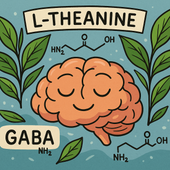
L-Theanine and GABA: Natural Calm for Parkinson’s-Related Anxiety
Anxiety in Parkinson’s often feels overwhelming — a constant inner tension that affects both body and mind. 🌿 This article explores how L-theanine and GABA, two natural compounds that promote relaxation without sedation, can help restore balance, ease restlessness, and calm the nervous system for a more peaceful state of mind. 🌙
-

Ashwagandha for Stress Relief in Parkinson’s: Can It Calm the Mind?
Ashwagandha, the ancient Ayurvedic adaptogen, may offer powerful stress relief for people with Parkinson’s. 🌿 By regulating cortisol, calming the nervous system, and supporting dopamine balance, this natural herb helps ease anxiety, improve sleep, and promote emotional stability — restoring calm from the inside out. 🌙
-
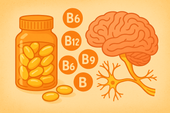
B Vitamins for Mood and Nerve Health in Parkinson’s Patients
B vitamins play a vital role in protecting the brain and nervous system in Parkinson’s. 🌿 From supporting dopamine production to reducing homocysteine and improving mood, these essential nutrients — especially B6, B9, and B12 — help stabilize emotions, boost energy, and preserve nerve integrity for better daily function and mental clarity. 💫
-
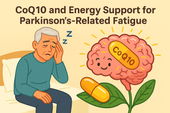
CoQ10 and Energy Support for Parkinson’s-Related Fatigue
Fatigue in Parkinson’s goes far beyond tiredness — it’s a deep cellular exhaustion. ⚡ CoQ10, a natural compound essential for energy production, may help restore vitality by supporting mitochondrial function and protecting brain cells from oxidative stress. Discover how CoQ10 can enhance energy, reduce fatigue, and improve overall resilience in Parkinson’s. 🌿
-
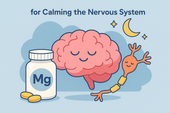
Magnesium for Calming the Nervous System in Parkinson’s
Magnesium is one of the most underrated allies for people with Parkinson’s. 🌿 This calming mineral supports the brain, relaxes tense muscles, and stabilizes the nervous system, helping reduce anxiety, restlessness, and sleep problems. Discover how magnesium nourishes dopamine pathways, protects neurons, and restores a sense of inner peace from within. 💫
-

Vitamin D and Mental Health in Parkinson’s: Why Deficiency Matters
Vitamin D is more than a sunshine nutrient — it’s a key player in brain health and emotional balance for people with Parkinson’s. 🌞 This article explores how vitamin D influences dopamine, serotonin, and inflammation, and why deficiency can worsen depression, anxiety, and cognitive decline. Discover how restoring healthy levels can bring clarity, calm, and resilience back to daily life. 🌿
-
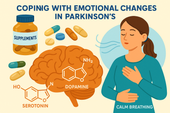
Coping with Emotional Changes in Parkinson’s: Supplements That Support Balance
Emotional changes like anxiety, depression, and irritability are common yet often overlooked symptoms of Parkinson’s disease. This article explores how supplements such as omega-3s, magnesium, and vitamin D can support mood regulation, while therapy and breathwork techniques help restore calm and emotional balance naturally. 🌿
-
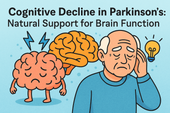
Cognitive Decline in Parkinson’s: Natural Support for Brain Function
Cognitive decline in Parkinson’s can affect memory, focus, and daily independence—but there’s hope. Understanding how the disease impacts brain chemistry opens the door to natural ways of support. From omega-3s and CoQ10 to mindfulness and exercise, you can nourish your brain, boost clarity, and slow decline through holistic care. 🌿🧠
-
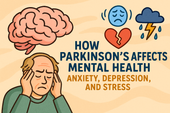
How Parkinson’s Affects Mental Health: Anxiety, Depression, and Stress
Dopamine is the brain’s spark of motivation—the chemical that fuels focus, pleasure, and drive. When dopamine levels are balanced, you feel inspired and alive; when they’re low, everything feels like an uphill climb. Understanding how dopamine works can help you support mental clarity, resilience, and emotional balance naturally. ⚡🧠
-

How Supplements Can Support Therapy and Healing from Co-Dependency
Biology is the science of life—an exploration of how cells, systems, and molecules create the foundation for every thought, emotion, and heartbeat. From the way our DNA shapes us to how hormones and neurons communicate, biology reveals the deep interconnectedness between mind and body. Understanding it helps us appreciate the delicate balance that keeps us alive, aware, and evolving. 🌿🧬
-

Creating a Supplement Stack for Emotional Independence and Balance
Biochemistry is the invisible language of life—how molecules, cells, and systems communicate to keep your body and mind in balance. From neurotransmitters shaping emotions to enzymes fueling energy, every process in your body reflects biochemical harmony. Understanding these reactions helps you see how nutrition, supplements, and emotions intertwine to support health, mood, and resilience. ⚗️🌿
-
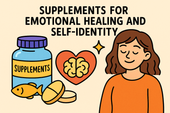
Supplements for Supporting Emotional Healing and Self-Identity
Biology is the bridge between mind and body—the science that explains how cells, hormones, and systems communicate to sustain life. It reveals how emotional states influence physical health, and how nourishment, rest, and movement keep us in balance. Understanding biology helps us reconnect with our natural intelligence and live in harmony with ourselves and the world. 🌿🔬
-

The Role of Antioxidants in Reducing Stress Damage from Toxic Relationships
Biology is the study of life in motion—the intricate dance between cells, systems, and the natural world. From DNA replication to neurotransmitter flow, every process in the human body reflects the intelligence of life adapting and evolving. Understanding this harmony helps us appreciate how nutrition, stress, and environment shape our health and emotional balance. 🌿🔬
-
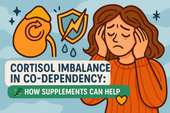
Cortisol Imbalance in Co-Dependency: How Supplements Can Help
Cortisol is the body’s main stress hormone—essential for energy and focus, yet harmful when chronically elevated. When life feels like constant pressure, cortisol imbalance can trigger fatigue, anxiety, and mood swings. Learning how to restore balance through rest, nutrition, and the right supplements can help you rebuild calm, clarity, and resilience from the inside out. 🌿💫
-

Adaptogens Like Rhodiola Rosea for Emotional Strength and Independence
Adaptogens are nature’s stress-balancing herbs—plants like Rhodiola, Ashwagandha, and Holy Basil that help your body adapt to emotional and physical pressure. They don’t numb or overstimulate; they teach your system how to find calm and stability again. By restoring balance to your hormones, energy, and mood, adaptogens nurture emotional resilience and grounded strength. 🌿✨
-
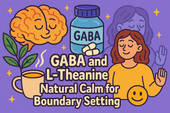
GABA and L-Theanine: Natural Calm for Boundary Setting
Anxiety can feel like a storm inside your mind—constant tension, overthinking, and the inability to relax even when you’re safe. But beneath the chaos, your body is simply trying to protect you. Learning to calm anxiety starts with understanding how your brain and nervous system respond to stress—and how to gently guide them back to peace. 🌿💫
-

How Omega-3s May Improve Emotional Regulation and Reduce Over-Attachment
Inflammation isn’t just about sore joints or fatigue—it’s also a hidden driver of mood swings, anxiety, and emotional burnout. When chronic stress or poor diet keep the body inflamed, the brain’s chemistry changes, making calm harder to access. Learning how to reduce inflammation through nutrition, rest, and mindful living helps restore balance from the inside out. 🌿💫
-

Magnesium for Calming the Nervous System in Co-Dependent Relationships
The nervous system is the body’s communication network, linking your mind and organs through a delicate web of electrical signals. It controls everything from emotional responses to muscle movement—and when it’s overwhelmed by chronic stress or anxiety, balance is lost. Learning how to calm and nourish your nervous system through nutrition, mindfulness, and rest can restore peace and emotional stability. 🌿💫
-

Ashwagandha and Co-Dependency: Supporting Stress Resilience
Stress is more than a feeling—it’s a full-body signal that your system is overwhelmed. When the mind races and the body tenses, your hormones, breathing, and focus all shift into survival mode. Chronic stress doesn’t just affect emotions—it reshapes your nervous system, drains your energy, and clouds your clarity. Learning to understand and manage stress gently is the first step toward peace, balance, and true recovery. 🌿💫
-

Why Co-Dependency Feels Draining: Adrenal Fatigue and Supplements That Help
The adrenal glands are small but powerful organs that sit above your kidneys, acting as your body’s built-in stress managers. They produce hormones like cortisol and adrenaline that help regulate energy, mood, and resilience. When they’re overworked from chronic stress or emotional exhaustion, fatigue and imbalance follow. Supporting adrenal health naturally can help restore calm, energy, and hormonal balance. 🌿⚡
-

The Link Between Anxiety, Co-Dependency, and Natural Support
Anxiety feels like living in constant alert mode—your heart races, your thoughts loop, and your body can’t find peace. It’s the nervous system’s way of preparing for danger, even when none exists. Understanding what’s happening in your mind and body is the first step toward calming the storm and restoring balance. 🌿💫
-

Supplements That Support Dopamine and Serotonin in Co-Dependent Patterns
Serotonin is the neurotransmitter of calm, confidence, and contentment. When it’s balanced, you feel peaceful and emotionally grounded. When it’s low, anxiety, mood swings, and emotional dependence take over. By understanding serotonin’s role in emotional health—and how to support it naturally—you can rebuild inner stability, improve relationships, and cultivate lasting happiness from within. 🌞💫
-

How Emotional Exhaustion in Codependency Impacts the Nervous System
The nervous system is the body’s communication network, connecting the brain to every organ and muscle. It regulates stress, mood, and emotion through a delicate balance of electrical and chemical signals. When overwhelmed, it can become dysregulated—leading to fatigue, anxiety, and emotional imbalance. Understanding how to calm and strengthen the nervous system is key to healing from chronic stress and emotional burnout. ⚡🌿
-

What Is Co-Dependency? The Role of Brain Chemistry and Stress
Stress is more than a feeling—it’s a full-body experience that begins in the brain and ripples through every cell. When cortisol surges and the nervous system stays on alert, your body can’t rest or recover. Over time, this constant tension affects energy, focus, mood, and even immune health. Understanding stress chemistry is the first step toward breaking free from burnout and finding calm again. 🌿
-

Creating a Supplement Stack for Motivation, Energy, and Anti-Procrastination
Motivation is the fuel behind every meaningful achievement—but it’s not just about willpower. It’s a mix of mindset, brain chemistry, and momentum. When energy, focus, and purpose align, action feels natural instead of forced. Learn how to harness motivation as a daily state, not a fleeting feeling.
-

Supplements for Building Consistency and Reducing Chronic Procrastination
Biochemistry is the bridge between biology and chemistry—the science of life at the molecular level. It explains how nutrients, hormones, and neurotransmitters interact to create energy, thought, and emotion. From brain function to muscle movement, biochemistry reveals the invisible processes that sustain health, balance, and vitality.
-

GABA and Procrastination: Supporting Calm Focus for Productivity
GABA is the brain’s natural calming messenger—a neurotransmitter that helps slow mental overactivity and ease stress. When GABA levels drop, focus fades, anxiety rises, and procrastination becomes more likely. By supporting GABA through nutrition, lifestyle, and supplements, you can restore calm clarity, improve focus, and take action with steady, balanced energy.
-

Ashwagandha and Procrastination: Lowering Stress to Improve Action
Science is the language of curiosity and discovery. It helps us understand the hidden patterns behind life, energy, and the universe. Through experimentation and critical thinking, science connects imagination to evidence—turning questions into knowledge. Whether through microscopes, molecules, or minds at work, science represents our endless pursuit of truth and innovation.
-

Neurotransmitters and Motivation: Supplements That Support Drive and Focus
Supplements can do more than boost physical health—they can also enhance mental clarity, focus, and motivation. Nutrients like omega-3s, magnesium, B vitamins, and adaptogens help balance neurotransmitters, stabilize mood, and support brain energy. When combined with good sleep, nutrition, and mindful habits, they can transform how your brain performs under stress.
-

How Stress Hormones Like Cortisol Fuel Procrastination (and What Helps)
Blood sugar isn’t just about physical health—it directly impacts focus, mood, and motivation. When glucose levels spike and crash, energy and attention do the same, fueling procrastination and brain fog. Learning how to stabilize blood sugar through balanced meals, mindful habits, and key nutrients helps keep your mind steady, focused, and ready to act.
-

Brain Fog and Procrastination: Supplements for Mental Clarity
Brain fog can turn even simple tasks into mental hurdles. When your thoughts feel slow and unclear, procrastination often follows—making focus and productivity seem impossible. This article explores the biochemical and lifestyle causes of brain fog and reveals the most effective supplements for restoring mental clarity, focus, and sustained energy.
-

The Link Between Low Energy and Procrastination: Can Supplements Help?
Neurochemistry shapes how we think, feel, and act. When neurotransmitters like dopamine, serotonin, and GABA fall out of balance, it can lead to fatigue, anxiety, or lack of motivation—fueling procrastination and low mood. Understanding the brain’s chemical communication system helps us find ways to restore focus, calm, and emotional stability through nutrition, mindfulness, and targeted supplements.
-

Why Do We Procrastinate? The Role of Dopamine and Supplements That Support It
Dopamine is the brain’s motivation messenger—the chemical that fuels focus, reward, and drive. When dopamine levels drop, even simple tasks can feel impossible to start. This article explores how dopamine shapes procrastination, motivation, and mental energy, along with natural supplements and daily habits that help restore balance and get things done.
-

Phosphatidylserine and Stress Reduction for People with BDD
Stress is more than a mental state—it’s a full-body experience that affects hormones, brain chemistry, and emotional balance. For people with Body Dysmorphic Disorder (BDD), constant tension and worry about appearance can overload the nervous system. Learning how stress works and finding ways to calm it is key to breaking the cycle of anxiety and self-criticism.
-

How Antioxidants Like Vitamin C & E Support Mental Health in BDD
Antioxidants are the body’s natural defense against stress and inflammation. For people with Body Dysmorphic Disorder (BDD), oxidative stress can worsen fatigue, anxiety, and emotional imbalance. Nutrients like Vitamin C and E help protect brain cells, boost neurotransmitter function, and support a calmer, clearer mindset—building a stronger foundation for recovery.
-

Ginkgo Biloba and Memory Support for BDD Recovery
Emotional regulation is the foundation of healing from Body Dysmorphic Disorder (BDD). When the nervous system stays in constant overdrive, even small stressors can trigger self-critical spirals. Learning to calm emotional reactivity helps restore clarity, confidence, and a sense of inner balance. By blending mindfulness, nervous system support, and self-compassion, you can retrain your brain to respond—not react—to emotion.
-

Alpha GPC and Cognitive Function in Body Dysmorphic Disorder
Mental fatigue can feel like your brain has hit a wall—thoughts slow down, focus fades, and motivation disappears. For people with Body Dysmorphic Disorder (BDD), chronic overthinking, emotional stress, and constant self-evaluation can deplete mental energy even further. Understanding what causes this cognitive exhaustion is the first step toward recovery—through rest, balanced nutrition, and targeted brain-supporting supplements.
-

N-Acetyl L-Tyrosine and BDD: Supporting Mental Clarity
Chronic stress doesn’t just affect your mood—it reshapes your brain chemistry, weakens focus, and fuels the obsessive thought loops common in Body Dysmorphic Disorder (BDD). Over time, constant cortisol elevation drains mental energy and emotional balance. Learning to recognize and manage chronic stress is essential to restoring mental clarity, self-compassion, and resilience.
-

Chamomile and Lavender for Calming Obsessive Body Image Thoughts
The nervous system is the command center of our emotional and physical world—and in Body Dysmorphic Disorder (BDD), it often operates in overdrive. Understanding how the brain and body communicate under stress reveals why intrusive thoughts feel uncontrollable. Learning to regulate the nervous system through calm practices, nutrition, and supplements helps restore inner balance and emotional safety.
-

Adaptogens for Body Dysmorphic Disorder: Rhodiola, Ginseng, and More
Rhodiola rosea, often called the “golden root,” is an adaptogenic herb renowned for boosting stress resilience and mental endurance. For individuals with Body Dysmorphic Disorder (BDD), Rhodiola may help reduce fatigue, regulate cortisol, and enhance emotional balance. By supporting both mind and body, this powerful plant promotes calm focus, improved mood, and renewed energy to face daily challenges.
-

B Vitamins for Stress Resilience in BDD: Rebuilding Calm from Within
Biochemistry is at the heart of every thought, emotion, and reaction we experience. In Body Dysmorphic Disorder (BDD), chemical imbalances in neurotransmitters like serotonin, dopamine, and GABA can amplify stress and distort self-perception. Understanding the biochemistry behind mood and stress regulation offers a path toward healing—bridging the gap between emotional experience and the body’s molecular balance.
-

Melatonin and Body Dysmorphic Disorder: Restoring Healthy Sleep Patterns
Melatonin, the body’s natural sleep hormone, plays a vital role in helping people with Body Dysmorphic Disorder (BDD) restore healthy sleep cycles. When anxiety and obsessive thinking interfere with rest, melatonin levels often drop, leading to more emotional reactivity and distorted self-perception. This article explores how melatonin works, why BDD disrupts it, and how natural supplementation—combined with mindful routines—can help the brain and body finally find calm at night.
-

Sleep Struggles with BDD: Supplements for Rest and Recovery
When you’re living with Body Dysmorphic Disorder (BDD), restful sleep can feel impossible—but the right supplements can help reset your body’s natural rhythm. From magnesium and L-theanine to 5-HTP and ashwagandha, these nutrients support relaxation, lower cortisol, and enhance melatonin production. This article explores how supplements can calm the mind, ease nighttime anxiety, and promote true restorative sleep for emotional and physical recovery.
-

5-HTP and Serotonin Balance: Could It Help with Body Dysmorphic Disorder?
Anxiety can feel like a storm inside the mind—restless, overwhelming, and hard to control. In people with Body Dysmorphic Disorder (BDD), anxiety often fuels obsessive thoughts and self-criticism, creating a painful cycle of worry and self-doubt. This article explores the biological roots of anxiety, the role of neurotransmitters like serotonin and GABA, and how natural strategies such as mindfulness, supplements, and nervous system regulation can restore calm and mental clarity.
-

Can Ashwagandha Help Ease Stress and Anxiety in Body Dysmorphic Disorder?
Neurotransmitters like serotonin, dopamine, GABA, and acetylcholine are the chemical messengers that shape how we think, feel, and react to stress. In Body Dysmorphic Disorder (BDD), imbalances in these neurotransmitters can amplify anxiety, obsessive thinking, and emotional distress. This article explores how restoring healthy brain chemistry through nutrition, supplements, and mindfulness can help bring clarity, calm, and emotional stability.
-

L-Theanine for BDD: Finding Calm in the Mind
Neurochemistry plays a central role in how we think, feel, and see ourselves. For those living with Body Dysmorphic Disorder (BDD), imbalances in neurotransmitters like serotonin, dopamine, and GABA can intensify anxiety, obsessive thoughts, and emotional distress. This article explores how regulating brain chemistry through supplements, mindfulness, and lifestyle changes can bring the nervous system back into harmony and restore inner calm.
-

Omega-3 Fatty Acids and Body Image Disorders: Supporting Emotional Health
Omega-3 fatty acids do far more than support heart health—they nourish the brain, stabilize mood, and may ease the emotional turbulence tied to body image disorders like BDD. This in-depth article explores how omega-3s regulate serotonin, dopamine, and inflammation, helping individuals reduce obsessive thoughts and rebuild self-acceptance. It also connects nutrition to therapy, mindfulness, and nervous system balance for holistic emotional healing.
-

Magnesium and BDD: Calming an Overactive Nervous System
Magnesium plays a crucial role in calming an overactive nervous system—something people with Body Dysmorphic Disorder (BDD) struggle with daily. This article explores how magnesium supports relaxation, emotional regulation, and stress reduction while diving into the science behind its connection to brain chemistry. It also examines how combining magnesium supplementation with therapy and breathwork can help rebalance the body’s stress response, reduce obsessive thought patterns, and promote lasting nervous system calm.
-

The Gut-Brain Axis and BDD: Why Probiotics Might Matter
The gut and brain are constantly in conversation — and that dialogue may shape how you experience Body Dysmorphic Disorder. By nurturing your microbiome with probiotics, prebiotics, and gut-healing nutrients, you can help rebalance serotonin, calm anxiety, and restore emotional stability from within 🧠🦠.

















































